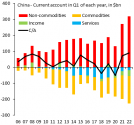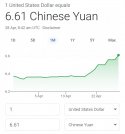You are using an out of date browser. It may not display this or other websites correctly.
You should upgrade or use an alternative browser.
You should upgrade or use an alternative browser.
Chinese Economics Thread
- Thread starter Norfolk
- Start date
China’s big new infrastructure plan prioritises national security in face of ‘extreme conditions’ at home, abroad
- China is once again looking to infrastructure to boost its slowing economy, but ‘development and security must be well coordinated’
- Commission chaired by President Xi stresses need to enhance critically important technological infrastructure, including supercomputing and artificial intelligence
Love it. This seems to be a plan based off a well disciplined, on balance sheet fiscal support, not like opening the spigot via monetary measures which is now taking a secondary role. Opening line up is the almost RMB 1.5T unspent budget allocations carried forward from last fiscal, and another RMB 1.7T from SOE's surplus profits. Local government bonds, almost the same as the previous year, sit at RMB 3.7T. So that's a lot of firing power on its own, not even counting the VAT exemptions and rebates for small business which would add another RMB 1.5T as fiscal stimulus.
RMB would most likely further slide, a controlled slide that is, to preempt Fed's May hike and auction size cuts, but it's still book-ended with PBoC releasing something like US 10B from reserve on May 15. So any one way bet against RMB, as always, would entail someone losing his shirt.
RMB would most likely further slide, a controlled slide that is, to preempt Fed's May hike and auction size cuts, but it's still book-ended with PBoC releasing something like US 10B from reserve on May 15. So any one way bet against RMB, as always, would entail someone losing his shirt.
Forget about "unintended consequences," that might be a bit too deep for them. They probably don't even understand the "consequences" part. For them it was probably:They still want decoupling but on their terms; and where they can inflict the maximum possible damage.They forgot that the law of unintended consequences still exists.
Decoupling = China destroyed, immediately. Everyone else happy.
I think China should let its currency weaken a bit. The US as it did 10-15 years ago tacitly allowed countries to devalue their currencies. China was likely threatened with currency manipulator status if it did the same. The result was China becoming a lot less competitive. For example, look at this:View attachment 87888
China's current account balance for Q1 2022 is out. Highest deficit for energy every recorded (yellow), but more than balanced out by the highest non-commodities surplus ever. Even if low may be slower this year than planned, the currency should not weaken much, and could possibly even strengthen.
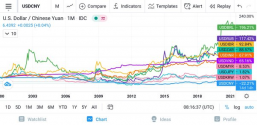
The result was this:
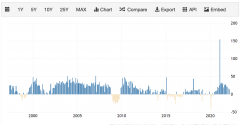
This is the growth rate of Chinese exports over the year. Do you see how the growth slows suddenly and dramatically after 2012? It was growing 30% every year before that. USD appreciation against all currencies except Yuan was the reason for this. China was plaza accorded but in reverse. And China was an export economy while this was happening. The result?
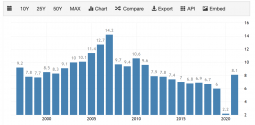
9-10% growth rate suddenly fell to 6.5-7.5%. Yes. China was plaza accorded but it was not as effective as the US wanted so we had an overt trade war after that.
The same is happening again. All currencies losing value against the USD. The Japanese Yen lost 15%, Euro lost 15%, Won lost 5%. China is not an export economy anymore but I think it shouldn't play nice this time. 5-10% depreciation may benefit China a lot.
Agree with your reason, but the caveat must be that depreciation is done as a temporary measure in the face of multiple headwinds. Aka depreciate the yuan to increase exports to soften the blow of COVID, Russo-Ukraine war and deflating property sector. In the long run, China must still seek to wean itself off exports as a source of growth. In fact, the lower the % of Chinese GDP as exports, the better. This is the same as Chinese dependence on foreign technology. The less, the better. Optimal scenario would be zero dependence.I think China should let its currency weaken a bit. The US as it did 10-15 years ago tacitly allowed countries to devalue their currencies. China was likely threatened with currency manipulator status if it did the same. The result was China becoming a lot less competitive. For example, look at this:
View attachment 87900
The result was this:
View attachment 87901
This is the growth rate of Chinese exports over the year. Do you see how the growth slows suddenly and dramatically after 2012? It was growing 30% every year before that. USD appreciation against all currencies except Yuan was the reason for this. China was plaza accorded but in reverse. And China was an export economy while this was happening. The result?
View attachment 87902
9-10% growth rate suddenly fell to 6.5-7.5%. Yes. China was plaza accorded but it was not as effective as the US wanted so we had an overt trade war after that.
The same is happening again. All currencies losing value against the USD. The Japanese Yen lost 15%, Euro lost 15%, Won lost 5%. China is not an export economy anymore but I think it shouldn't play nice this time. 5-10% depreciation may benefit China a lot.
USD strong like almost never before, with the pumping so much dollars during last few years, the rest of the world love USD.
Yuan weakens further.
Yuan weakens further.
I both disagree and agree. Every relationship brings mutual interdependencies but China shouldn't be a walled garden. Walled gardens usually don't perform as well as they could. I would like China to be like the EU in trade openness when it becomes a fully developed country. Of course, tech self-sufficiency is a must so it will be a bit less open. And China is not an export economy anyway:Agree with your reason, but the caveat must be that depreciation is done as a temporary measure in the face of multiple headwinds. Aka depreciate the yuan to increase exports to soften the blow of COVID, Russo-Ukraine war and deflating property sector. In the long run, China must still seek to wean itself off exports as a source of growth. In fact, the lower the % of Chinese GDP as exports, the better. This is the same as Chinese dependence on foreign technology. The less, the better. Optimal scenario would be zero dependence.
It is less of an export economy than Peru and India.
Currency value wise, as you said, it can always appreciate again. It appreciated by 11% in 2020.

